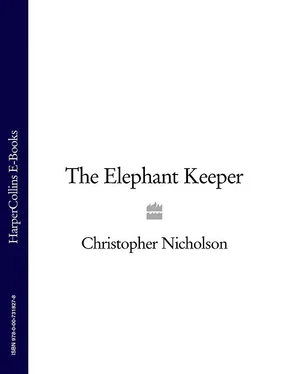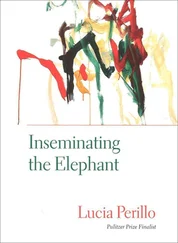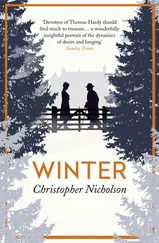It was clear that I needed to press on with their training, and I began to teach them certain signs and sounds. They regarded me attentively, for when they did well I praised them loudly and rewarded them with carrots or fruit. When they did badly, I shook my head and reproved them by wagging a finger, but this was seldom necessary. They learnt quickly, much more quickly than horses; indeed, it was remarkable how fast we went, so much so that I often wondered whether they had not already received some training in the Indies. One reason for their speed was that they imitated each other. While they watched me, awaiting the next order, and often anticipating it before it was given, they also watched each other.
Within a matter of days they were willing to walk forward, to stop, to turn to the left and right, and to walk backward. I then taught them to kneel. Among the differences between horses and Elephants is that, while a horse has three bones in its leg, an Elephant has only two; thus the horse, when kneeling, brings his hind legs under his body, while the Elephant lets his go before him, like a human being.
All this training I did either in the cart-house or in the yard, and all the time I kept their front and back legs roped. In addition, I made a kind of harness, which I attached to their upper bodies, tying it under their bellies and drawing it between their front legs.
My next step was to teach them to lie down. This proved more difficult, for although Elephants will lie down to sleep at night, for an hour or two, this runs counter to their natural inclinations, which are to stay on their feet; for when on the ground they cannot rise quickly to their feet and are all but defenceless, unable to use their tusks or trunks to defend themselves against any enemies. For this reason it took many hours of teaching before I could persuade them to do my bidding. I took care never to shew my emotions but to remain entirely patient, in the certainty that my will would in the end prove the greater, as eventually proved the case. It was Jenny who first yielded, dropping to her knees and tilting her body to one side so that she fell, crumpling, to the ground; whereupon I praised her loudly and rewarded her with food, and the sight of this convinced Timothy to do likewise. As they lay in the dusty yard, breathing slowly, with the spring sun on their bodies, I felt a great sense of satisfaction that two such creatures, the most powerful beasts in the animal kingdom, should have bowed to my will; and also some regret that neither my father nor my fellow grooms, who were busy exercising the horses, had witnessed this singular event. The succeeding day I took care to repeat the feat when Bob and Dick were watching, hoping to impress them mightily, but to my disappointment they said nothing and feigned complete indifference.
However, when I gave a demonstration of the Elephants’ progress to Mr. Harrington, he expressed his astonishment and pleasure. ‘But, Tom,’ he went on, ‘you should not be doing this alone. Each Elephant should surely have his own groom. Why is Martin not helping? Or Dick?’—‘Sir,’ I said, feeling somewhat uneasy, ‘it is easier by myself. The Elephants prefer a single keeper.’—‘They do, do they? Both of them? They have clearly expressed their preference for a single keeper?’—‘Yes, Sir. And my father helps me.’—‘If you say so,’ said Mr. Harrington, who was perhaps a little surprized, ‘but pray, Tom, how have they expressed this preference?’—‘Sir,’ I said, ‘they refuse to obey the other grooms. They will not obey them.’—‘They will not obey them?’—‘No, Sir. They refuse. They pretend to be deaf. They will only obey me.’
While this was true enough, it was also true that none of my fellow grooms ever attempted to make friends with the Elephants, or ever offered them any tokens of affection. At the time, I could not easily understand this, but now I think that it derived partly from fear, and partly from resentment at the extent to which the Elephants drew attention away from the horses. Mr. Harrington made no secret of the fact that he was more interested in the Elephants than the horses. My father, moreover, being head groom, felt that the Elephants disrupted the smooth running of the stable-yard. Here I should also mention the curious antipathy which exists between horses and Elephants. Even before the horses in Mr. Harrington’s stables had seen the two Elephants, they smelt them; and, not liking what they smelt, became agitated. They were more difficult to handle; they stamped, and neighed, and these symptoms became all the more pronounced when the Elephants began to squeal and trumpet. Soon enough, the horses set eyes on the Elephants, and this frightened them so much that several sweated and shivered uncontrollably, and refused to eat. It seems that all horses are frightened of Elephants. Quite why there is such antipathy is not for me to say, but there is a fixity, an intensity, in an Elephant’s beady stare which strikes terror into the heart of the bravest horse.
After this conversation, Mr. Harrington seemed to accept that I should be sole keeper of the Elephants; at least, he never mentioned the matter again. For this, I believe, I have to thank Mr. Coad, who visited the Elephants, and who told Mr. Harrington of the personal attachments which, in the Indies, form between Elephants and their mahoots . Indeed Mr. Coad, when talking to Mr. Harrington, always referred to me by this curious word, mahoot .
Mr. Coad was a gentleman of middle age, originally from Lancashire, and his character was plainly expressed by the rugged, wrinkled appearance of his face, somewhat like that of an ancient bulldog. When he delivered his opinion on any matter concerning the Elephants—which he generally did with his legs astride, and hands on his hips—he did so in a tone which seemed to say that anyone foolish enough to challenge him should expect a sharp bite. Nonetheless, much of what he had to say I found very interesting indeed.
In the Indies, he said, the Elephants were employed by the princely rulers to execute criminals, which they accomplished by trampling their bodies, or breaking their limbs, or impaling them on their tusks, according to the direction of their mahoots . At the invitation of the Prince of Udaipur, Mr. Coad had witnessed the execution of a man who had been found guilty of ravishing a young girl. Hands tied behind his back, eyes blind-folded, he knelt on the dusty ground and awaited his fate, while the Elephant, a tusker , slowly advanced with its mahoot on its neck. It halted before the kneeling man and, at a word of command, lashed out with its trunk. The guilty man fell, uttering a single cry, which was promptly silenced as the Elephant stood on him with one of its fore-feet and crushed his chest. As an act of completion, the Elephant swept the body into the air, raising it to a height of six or seven feet, before dashing it to the ground and driving a tusk through the neck. At this point the execution was over; the tusker backed away, and the relations of the dead man were allowed to claim the body. What was impressive, said Mr. Coad, was the solemn manner in which this execution was carried out, the Elephant obeying his mahoot’s instructions to the letter, and acting, so far as he could judge, as the perfect agent of human justice. ‘It is infinitely preferable to the sordid hangings that we have in England,’ he told Mr. Harrington. This account of the execution haunted me for many nights, and sometimes haunts me even now: I picture the kneeling man, I enter his mind and hear the slow tread of the approaching Elephant, like the approach of Death itself, and I listen with terror for the faint swish of the trunk, the last sound that I shall ever hear.
In the Indies, said Mr. Coad, it is considered a great honour for an Elephant to be appointed an executioner. Other Elephants work in such tasks as plowing, pulling carriages and hauling heavy loads of wood and rock, much like draught horses and oxen in England, though the loads they draw are far heavier. A token of their great strength is that they sometimes also help with the launching of ships.
Читать дальше












